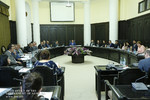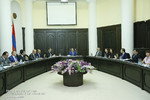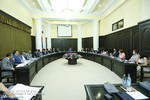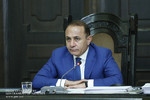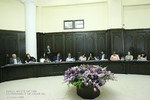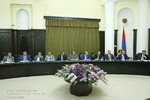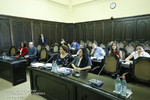Tuesday, 28 July 2015
Anticorruption Council Holds First Meeting
Chaired by Prime Minister Hovik Abrahamyan, the Anti-Corruption Council held its first meeting in the Office of Government. Opening the meeting, the Prime Minister said, “The fight against corruption is a key area in the Government’s domestic policy. The fight against corruption is underpinned by an appropriate institutional system, which guarantees the effective implementation of the anticorruption policy. To this end, with its decision numbered N 165-N of February 19, 2015, the Government established the Anticorruption Council. The Council has the task of coordinating and monitoring the anti-corruption reform. Here, I would like to once again stress the importance of all the stakeholders’ participation and cooperation in the fight against corruption.
Our goal is to unite all those forces and organizations around the proposed format which may have a say and the understanding of our shared goals along this path. This is a platform where we can mobilize our capacity and experience to take decisive steps. I assure you that the Government is conscious of the need and importance of such steps as should be taken to consistently advance the anti-corruption reform process.
We have the necessary will and the determination to work everyday on the way to this end. Our work will be transparent, and we will do everything to make their results publicly visible. While some of our partners refused to join the Council, we have invited them to attend today’s meeting.
I hope that both the National Assembly opposition groups and those NGOs which refused to get involved in the Council’s activities will cooperate with the Council, contributing with their knowledge and expertise in the fight against corruption. This is the only way to form a single vision, unified approaches and move on.
I would like to note that today’s meeting will discuss a number of important issues. In particular, a new anticorruption strategy will be presented, the issue of imposing criminal or administrative liability for legal persons will be discussed, which is of paramount importance for economic development and preventing businesses from getting involved in corruption. This issue is also important in terms of international cooperation.
Next, the meeting will review the Council’s and affiliated expert committee’s terms of reference and draft experts project selection procedures, as well as the relevant criteria. Finally, the draft cooperation agreement with the US Agency for International Development (USAID) will be discussed along with its attachments.
The sanctions for failure to issue a declaration, freedom of information, public participation in policy development and the fight against corruption will come under discussion and, in this respect, the activities of individual Ministry-affiliated public councils.
In conclusion, the meeting will examine Armenia’s willingness to join the advanced international extractive industries transparency initiative. I wish everybody effective work.”
The Council then proceeded to the agenda. First, First Deputy Minister of Justice Arsen Mkrtchyan presented the anticorruption strategy and the relevant action plan for 2015-2018.
It was noted that the main objective of the Anticorruption Strategy is to shape a corps of honest and responsible public officials to minimize the scope of corruption in the country and build up the citizens’ confidence in State administration bodies, as well as to promote the principle of intolerance towards corruption.
Arsen Mkrtchyan noted that the strategy consists of four chapters. The first chapter focuses on the anticorruption policy, the fight against corruption. Chapter Two describes the basic tools in the fight against corruption. Chapter Three the main areas covered by the anticorruption program and finally Chapter Four outlines the system of monitoring and assessment criteria relevant to the Anticorruption Strategy for 2015-2018.
During the exchange of opinions that followed, the speakers stressed the fact that debates had been held with all the stakeholders and the representatives of civil society in all the regions of Armenia. The summary of the strategy was complemented with recommendations and respective acceptance or non-acceptance substantiations received and processed online.
Summing up the opinions expressed during the meeting, the Prime Minister suggested approving the document and submitting it to the Government as a legal act for acceptance.
“This strategy was developed on the basis of recommendations made by Council members and other interested entities. In addition, the Ministry of Justice has put it up for public discussion," Hovik Abrahamyan concluded and instructed the Government Staff to prepare it for a Cabinet meeting debate after receiving the final version of the agenda.
The representative of the Delegation of the European Union welcomed the launch of the Anticorruption Council and expressed satisfaction with the involvement of the EU in council activities.
The meeting next discussed the issue of corporate criminal or administrative sanctions. First, detailing the issue, the Deputy Minister of Justice noted that effective investigation and detection of corruption offenses provide a strategic tool in the fight against corruption, considering that the offenses committed by legal entities are the most dangerous for the economy.
To prevent corrupt behavior on the part of legal entities, many countries have developed administrative or criminal liability mechanisms, while Armenia is short of such institutions. According to the applicable law, the individuals responsible for irregularities are prosecuted for legal entities’ corrupt behavior in Armenia, which according to the speaker, is a legislative gap and an impeding factor.
Arsen Mkrtchyan informed that the provisions of both the government-approved concept of the fight against corruption in public agencies and the concept of the new Criminal Code define the scope of corruption or criminal liability for legal persons and added that the acknowledgement of an administrative or criminal liability for legal persons’ misbehavior is a top priority on the way to combating corruption.
Summarizing the comments voiced on the matter, the Prime Minister described it as of top priority. “I agree that in order to make extra profit sometimes companies enter into corrupt deals, which undermines healthy and equitable competition. I instruct the Ministry of Justice to reflect the aforementioned approaches in the new Criminal Code of Administrative Offences and put into circulation along with appropriate recommendations within the time limit set by the Government.”
Then Minister-Chief of Government Staff David Harutyunyan introduced the rules of procedure of the Anti-Corruption Council, which streamline the relations stemming from its activities, involvement the management of activities, holding of regular meetings, drafting of minutes, adoption of decisions and so on.
The meeting next reviewed the terms of reference of the Council-affiliated expert committee. The expert committee is a group of experts, whose main task is to support the development of strategy and anti-corruption programs, monitor and assess programs and submit summary reports to the Council. The Council approved the drafts and instructed the Minister-Chief of Government Staff to finalize them for ratification.
The Board also discussed and approved the procedure for selection of expert committee members in accordance with the Government’s relevant resolution, as well as the criteria that should govern the relations associated with the selection of expert committee members and two international experts on a competitive basis.
“I think that the adoption of this issue is very important from the point of view of the effectiveness of the entire anti-corruption system. By establishing accurate criteria for selection of experts and having experts with relevant skills and expertise, we will get an objective idea of the progress in implementing the anti-corruption strategy, and by identifying shortcomings, we will try to address them quickly,” Prime Minister Hovik Abrahamyan said in connection with the matter and instructed Minister-Chief of Government Staff David Harutyunyan to submit a finalized decision for signing.
Under the next item, Minister-Chief of Government Staff David Harutyunyan presented the details of the cooperation agreement and attached documents to be signed between the Government of the Republic of Armenia and the US Agency for International Development (USAID). In this connection, he noted that the US Agency for International Development has expressed readiness to assist the Government of Armenia with the implementation of Armenia’s Anticorruption Strategy. The total cost of the program is 750 thousand US dollars. The Government of Armenia will co-finance 25 percent of the program cost, including in-kind.
The aid will be aimed at establishing an expert group, launching the Anticorruption Strategy for the years 2015-2018, as well as developing and implementing stakeholders’ public relations strategy and program of action.
According to David Harutyunyan, the program will enable the Government to involve highly skilled international and local experts in the process of needs assessment and risk analysis, neutralization of corruption risks, provision of specialized and methodical consultation prioritized anti-corruption strategy in the education, public revenue, healthcare and Police-administered services, as well as to raise awareness of different target groups in society. The Council approved the proposal for signing the aforementioned agreement.
“This is another example of our productive work with the US Agency for International Development, and we are grateful for their willingness to contribute to this important process,” the Prime Minister said and ordered to finalize the agreement for inclusion in the agenda of the next session of the Government.
The Council then discussed the establishment of sanctions for failure to submit a tax return. Chairwoman of Senior Officials Ethics Commission Siranush Sahakyan noted that the commitments assumed by the Republic of Armenia in the fight against corruption call for the development of effective procedures for application of legal measures for failure to comply with the rules governing the process of declaration.
She noted that in March 2015, the Ministry of Justice put into circulation a bill amending the Code of Administrative Offences, which envisages application of appropriate sanctions for breach of declaration-related regulations. In particular, administrative liability was set as an acceptable type of responsibility; warning and fines were defined as means of punishment.
Siranush Sahakyan stressed that the Ethics Commission fully supports the implementation of such steps, and at the same time introduced a number of comments, which as she said will help ensure integrity and improvement of the instruments applicable to the declarations of senior officials. During the exchange of views that followed, the speakers came up with specific opinions and recommendations.
Summing up the discussion, the Prime Minister said: “Since the adoption of the law “On civil service” we have faced a lot of criticism regarding the shortcomings of the institute declaration. I agree that the institute of declaration is relatively new and may have legislative gaps. However, we must all admit that a lot of work has been done in this area thanks to which mass media can follow the process of declaration, reveal and expose the shortcomings.
I believe that the public officials allowing omissions in the declaration process should be held accountable. As a first step, I am hereby instructing the Ministry of Justice to submit to the Government within two months such amendments to the Code of Administrative Offences of the Republic of Armenia as will allow the Ethics Commission to impose responsibility for violation of declaration regulations.
The NGO representatives in attendance of the first meeting of the Anticorruption Council welcomed the start of its proceedings and noted the importance of this format of dialogue between the authorities and civil society.
Chairwoman of Freedom of Information Center NGO Shushan Doydoyan noted that an important precondition for the Council’s successful work is to build up public confidence through tangible results.
Shushan Doydoyan further noted that serious progress has been recorded in the field of freedom of information in recent years. In this respect, she indicated the presence of persons responsible for freedom of information in all public agencies, the development by the Government of a procedure for the provisions of information, etc.
She touched upon the situation and the problems existing in the field of freedom of information, noting that access to information is a fundamental tool for ensuring effectiveness in the struggle against corruption as it ensures openness and transparency of government activities, promotion and protection of basic human rights and helps build trust in authorities’ and government’s activities.
“I consider it unacceptable that the law of the Republic of Armenia “On freedom of information” has been effective for over 10 years now, while no appropriate regulations have been passed so far,” the Prime Minister said and gave two months o the Ministry of Justice to prepare and submit to the Office of Government relevant draft regulations.
Then the floor was given to Yerevan Press Club expert, Executive Director of the Secretariat of Armenia’s National Platform of Civil Society Forum of Eastern Partnership Program Heriknaz Harutyunyan, who welcomed the first meeting of the Anticorruption Council and the participation of civil society representatives in the meeting.
In her speech Heriknaz Harutyunyan addressed the issue of creating public councils by the Ministries and presented the results of a recent EU-supported survey on involvement of civil society in different formats of cooperation with the authorities, conducted under the “Civil Society Dialogue for Progress” program. Speaking about the public councils’ activities, she noted the importance of building public confidence and creating effective mechanisms for dialogue.
Summing up the exchange of opinions, the Prime Minister stressed the importance of civil society participation in policy-making processes. The Head of Government stressed that the public councils’ proactive and productive activities are important to exchange information, ideas, views, demands of society and sustained dialogue.
“We appreciate the opinion of civil society in policy and decision making processes and need to create appropriate tools and platforms so that the cooperation may prove effective. I am hereby instructing the Ministry of Justice to discuss the proposals voiced and submit to the Office of Government model rules of procedure for ministry-affiliated public councils.”
At the end of the first meeting of the Anticorruption Council, the readiness of the Government of the Republic of Armenia to join the Extractive Industries Transparency Initiative (EITI) was proclaimed.
Minister-Chief of Government Staff David Harutyunyan noted that this international organization is a coalition of governments, mining companies and civil society, which makes it possible to increase the transparency of business activities in the mining sector and ensure favorable competitive conditions.
In connection with this issue, Prime Minister, Abrahamyan stated as follows: “I attach great importance to the initiative of joining the Organization, and will personally oversee the successful completion of the accession procedure. The Republic of Armenia has always attached importance to ensuring transparent, predictable and competitive rules for businesses. Our intention to join the initiative shows once again how much importance we attach to the implementation of international standards in Armenia, as well as Armenia’s active participation in ever-changing global processes. On behalf of the Government of the Republic of Armenia, I would like to instruct David Harutyunyan to coordinate the process and work on introduction of relevant standards.”
Summing up the results of the first meeting of the Anticorruption Council, Hovik Abrahamyan said, “We talked about the negative role of corruption in various spheres of public life and society. It was also noted that corruption has a huge negative impact on the country’s economic development and the implementation of economic investment. Such processes may have a very negative impact. Ensuring sustainable economic development in the country is high on our policy agenda. From this perspective, I attach great importance to the cooperation with the business community in the fight against corruption.
Convinced that in order to ensure such cooperation, it is expedient to set up an appropriate platform within the Anticorruption Council, I am hereby instructing Government Staff to organize during the year meetings with the representatives of business circles - large, medium and small businesses – enabling them to voice their concerns related to corruption phenomena, we will try to find effective solutions.
I think that such a cooperation platform will be effective in terms of reducing corruption risks that impede business and economic development. I feel that today’s meeting was productive as the discussion was very sincere, and I am convinced that it will be more transparent and sincere in the future.”
The Head of Government thanked all the Council members and NGO representatives for effective work, assuring that as Prime Minister, he will do everything to create an atmosphere of dialogue and lead the country onwards.







